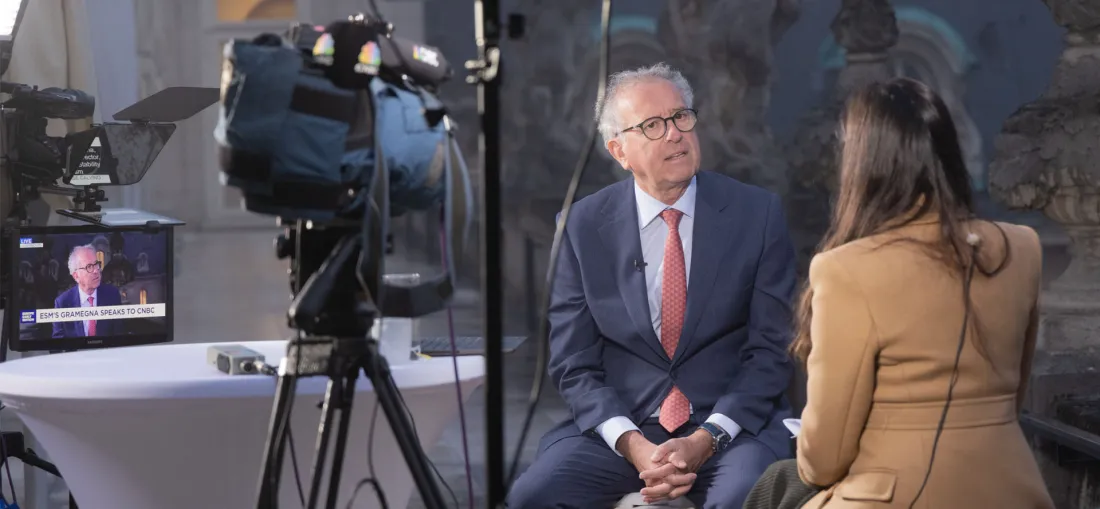Pierre Gramegna in CNBC interview in Luxembourg

Transcript of interview with ESM Managing Director Pierre Gramegna
CNBC
1 October 2025
Interviewer: Silvia Amaro
CNBC: I'll start the conversation looking at the general state of capital markets. This is a topic that we have been discussing for many, many years. There seems to be a little bit more of a push now under this new Commission. But how would you describe the current state of capital markets in Europe?
Pierre Gramegna: Well, we started 10-12 years ago with this initiative. It had another name, and thanks to the Draghi and Letta reports, all these issues have come to the forefront, and I think there's a consciousness that we have to advance much faster. I would like to say that what Europe has to do on this item, the savings and investments union, is act, act, act, and having also pragmatic solutions like the one that the Commission proposed yesterday, a savings and investment account, because Europe is the leader in the world in saving. We're saving much more than any other country in the world, and a lot of that money stays on bank accounts and is not used to buy stocks and spur the economy. This is a pragmatic solution. Obviously, you need to have tax incentives that the European Commission recommends. This is a concrete action. We, as European Stability Mechanism, have, by the way, in a blog some time ago, suggested that this is one of the ways forward; that we have to look at and inspire ourselves from Sweden, for example, or the Netherlands, which have such accounts.
Interesting that you mention those two countries. In fact, not too long ago, we were discussing how Sweden is having a lot of IPOs at this stage. But thinking more broadly about the Eurozone and where we are at this stage, the ongoing conversation is also around fragmentation. To what extent is this a problem that you can actually fix in the Eurozone? When you think about the difference of opinions, not just among the capitals, but then what happens between Brussels and the rest of the euro area?
I think there are things that are maturing. For example, let me say one of the important pillars that's missing is the common deposit insurance scheme in Europe. Why was that not possible? Because we had non-performing loans in many countries that were extremely high. So, the countries that had a better situation didn't want to take that risk. Today, non-performing loans in Europe are down, are very low. So, the situation has changed. And this is an important topic where progress would be easier to have today because we have done our homework.
And yet we're not seeing it. There's no approval yet.
There’s no approval, but it has been on the sidelines. I chose this important topic; I could have mentioned many others. You could also say, for example, that we need more common funding in Europe in an area like defence. There are lots of initiatives that are taking place and which are working.
I'd also like to get your thoughts in terms of investor appetite. You've said several times this year that there's a growing interest in investing in Europe amid concerns with US assets, ultimately. How are you seeing it at the moment? Have things slowed down in terms of European investment as we go into this end of the year?
What we saw in April was a very rare event. On the day where the tariffs were announced by the American administration, equities went down. At the same time, American bonds went down, American treasury bills went down, and the dollar went down. A thing that was rarely seen. It seems that investors are partly questioning the role of safe haven of the dollar. Now, this is an opportunity for Europe. The euro represents more or less 20% of the world's central bank reserves. The euro is the second most important currency in the world. There is more and more appetite for the euro for lots of reasons, also for political and geopolitical reasons, because we have a very stable framework. We are rules-based, and there is certainty and a confidence-building atmosphere that investors like.
Can you offer that stability, that confidence to investors when you have a lot of fiscal problems in the Eurozone, for instance, France?
When you look at the situation, the fiscal situation of European countries, it is one that benefits from the fact that we have common rules and that we have rules to have sound fiscal policies. We have a new set of rules for the Stability and Growth Pact. For the time being, France is complying with the reduction of debt that is agreed for its path to adjust. If you look at the spreads in Europe, they are at their lowest for a long time. That shows that markets believe that Europe is serious about reducing its deficit. If I look at the United States, at Japan, where I was last week, the deficits are much larger and debt-to-GDP is higher than the average of the EU. I think we should sometimes also underline that we are maybe sometimes too pessimistic about ourselves.
When you think about how Europe, to some extent, has benefited from the concerns around US assets, are you thinking that it might be the case now as well, that we are witnessing a government shutdown stateside? Can that be good news for Europe?
I would not like to be seen like rejoicing because there's a shutdown in the United States. Financial stability is a common public good, and that's good for all the countries in the world. Now, if the largest economy in the world has a shutdown, it's bad news for anybody. I hope they find a solution to that. But on the other hand, yes, we don't have a shutdown in Europe. Again, it underlines the fact that we have a very stable framework in Europe, and I think investors appreciate that.
Just finally, going back to the point that we'll be discussing in the conference later today around capital markets, one of the question marks as well is around whether we're actually going to see a meaningful banking union. There have been a lot of political interferences ultimately in seeing bigger banks in Europe. Does the Eurozone have a problem, a political problem, in accepting bigger banks?
You can see that many countries have a problem with that because they're trying to slow down mergers, especially when they are cross-border. There have been many examples in the recent past. This is an issue. But it is in the hands of countries if they want to solve them. It is clear that our banks do not have the size of the American ones. This is a fact. Now, how to solve that is maybe more complicated than maybe just working on having common rules, and having a savings and investments union with few, if not any obstacles so that we can grow better and have more growth and more productivity. That's what we need in Europe.
Just to conclude and to understand your final point, you're suggesting that we might more quickly see progress on a savings union rather than on the banking union.
The fact that there are mergers or there are not mergers is the rules of the market. We need to have the best possible framework, and that's what I was saying.
Author

Contacts


